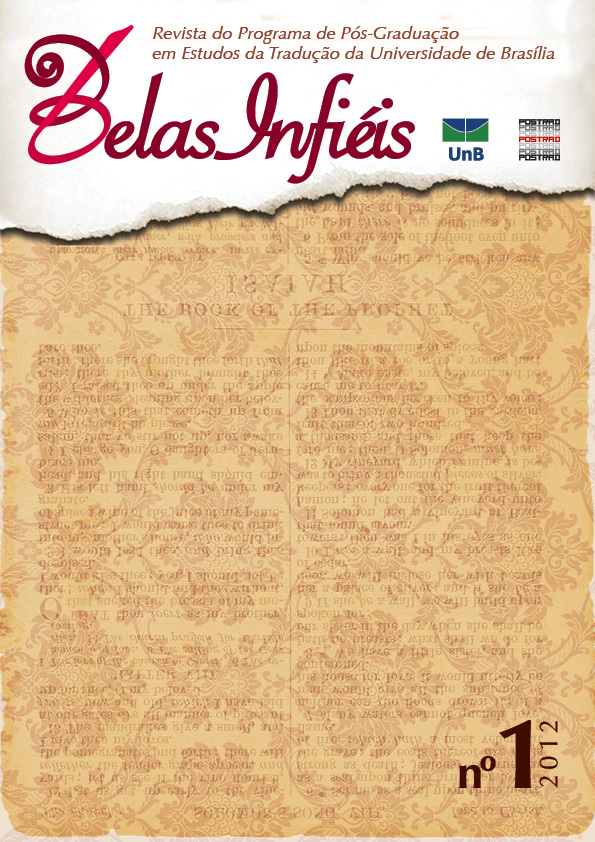ESTRATÉGIAS E FERRAMENTAS DE TRADUÇÃO NO UNIVERSO DIGITAL
DOI :
https://doi.org/10.26512/belasinfieis.v1.n1.2012.11169Mots-clés :
Estudos da Tradução, Estratégias tradutórias, TecnologiaRésumé
O presente trabalho visa expor as conclusões e reflexões provenientes da pesquisa realizada em âmbito de mestrado pelo presente autor. A pesquisa tem caráter exploratório e o intuito de determinar as possíveis ferramentas digitais on-line e off-line e suas formas de uso que podem auxiliar o tradutor durante o processo tradutório. Os dados para a análise foram gerados a partir de três grupos de informantes: tradutores inexperientes, tradutores estagiários e tradutores profissionais. A metodologia deste trabalho tem como base o conceito de triangulação, de forma que os dados foram obtidos a partir de aplicação de questionários e criação de protocolos verbais, tanto através da técnica de introspecção simultânea, quanto através da técnica de retrospecção imediata. Ao final da pesquisa foi possível determinar um paradigma para classificação das ferramentas tradutórias
Téléchargements
Références
CORRÊA, Angela Maria da Silva; NEIVA, Aurora Maria Soares. Estratégias e problemas do tradutor aprendiz:uma visão introspectiva do processo tradutório.In: MONTEIRO, Maria José (Org.). Práticas discursivas: instituição, tradução e literatura, UFRJ, Rio de Janeiro, 2000.p.34-52.
COSTE, Daniel. Leitura e competência comunicativa.In: GALVES, C., ORLANDI, E., OTTONI, P. O Texto: escrita e leitura.Campinas: Pontes, 1988.
CUNHA, Tânia Reis.Fatores discursivos de interrupção do fluxo tradutório do francês para o português. 2002. 230 f. Tese (Doutorado) -UFRJ, Rio de Janeiro. 2002.
ERICSSON, K. A.; SIMON, H. A. Verbal reports on thinking.In: FAERCH, C.; KASPER, G. Introspection in second language research. Multilingual Matters Ltd: Clevedon, Philadelphia, 1987. p. 24-53.
FAERCH, C.; KASPER, G. On identifying communication strategies in interlanguage production. In: FAERH, C.; KASPER, G. (Ed.). Strategies in interlanguage communication. London: Longman, 1983.
JÄÄSKELÄINEN, Riitta (1993). Investigating Translation Strategies. In: TIRKKONEN-CONDIT,Sonja; LAFFLING, John (eds). Recent Trends in Empirical Translation Research. Studies in Languagesn 28. Joensuu: University of Joensuu. p. 99-120.
JAKOBSEN, A.L. Logging target text production with Translog. In HANSEN, G (Ed.).Empirical translation studies: process and product,(Copenhagen Studies in Language Series 27). Copenhagen: Samfundslitteratur. 2002. p. 9-20.
__________. Orientation, segmentation, and revision in translation. In HANSEN, G (Ed.). Empirical translation studies: process and product,(Copenhagen Studies in Language Series 27). Copenhagen: Samfundslitteratur. 2002. p. 191-204.
KLEIMAN, Angela. Texto e leitor: aspectos cognitivos da leitura. Campina, SP: Pontes, 1989. 82p.
LÖRSCHER, Wolfgang. Translation Performance, Translation Process, and Translation Strategies: A Psycholinguistic Investigation. Tübingen: Gunter Narr, 1991.
MOIRAND, Sophie. Enseigner à communiquer en langue étrangère.Paris: Hachette, 1982. 188 p.
PAGANO, Adriana; MAGALHÃES, Célia; ALVES, Fábio. Traduzir com autonomia:estratégias para o tradutor em formação. São Paulo: Contexto, 2000.
PAVÃO JUNIOR, Jadyr. A língua do Google. Veja, São Paulo, n. , p.122-131, 05 abr. 2010. Semanal. Disponível em: <http://clippings-artigos.blogspot.com/2010/05/lingua-do-google.html>. Acesso em: 18 maio 2010.
SANTOS, Luiz Américo Portela dos. O processo tradutório: análise de problemas e estratégias de solução em tradução do francês para o português.Dissertação (mestrado). Letras Neolatinas. Rio de Janeiro: Faculdade de Letras, UFRJ, 2002.
SILVA, Lucília Marques Ferreira da. Pesquisa auto-etnográfica do processo tradutório desenvolvido de metodologia e análise do uso de buscas externas.Dissertação (mestrado) -Letras Neolatinas. Rio de Janeiro: Faculdade de Letras, UFRJ, 2005.
Téléchargements
Publié-e
Comment citer
Numéro
Rubrique
Licence
Copyright Statement
Given the public access to this journal, the texts are free to use but requires the recognition of the original authorship and initial publication in this journal to be properly stated.
The journal allows the use of works published for non-commercial purposes, including the right to submit the work to publicly accessible databases. Published contributions are the sole and exclusive responsibility of the author(s).
- When submitting papers to be evaluated by the Belas Infiéis journal, the author(s):
- Declare that the contents of the contributions are original and of their original creation, being entirely responsible for their content if there is an objection by third parties.
- Claim to be aware that they should not commit academic plagiarism.
- Declare that the manuscript has not been published, completely or partially, in Portuguese or another language. If it is a translation it should be submitted to the Translated Articles section.
- Declare that the manuscript is not being evaluated by other journals.
- Declare that the manuscript was not submitted to another journal simultaneously.
- Commit(s) to inform the journal of any kind of error or inaccuracy in their contribution (published, in evaluation or in editing) and to collaborate with the editors to make due corrections of the article (when in evaluation or editing) or erratum/retraction (after publication).
- Declare that there is no conflict of interest regarding the published work.
- Authorize its release if it is accepted for publication without any kind of monetary compensation.
- Agree to assign non-exclusive rights to publication to the magazine, remaining free to make their contribution available in other media as long as the publication of the first version in Belas Infiéis magazine is mentioned. They also authorize Belas Infiéis to assign their texts for reproduction in content indexers, virtual libraries and similar platforms.
- Maintain copyright and grant the journal the right of first publication, the work being licensed under theCreative Commons Attribution License.
- Is/Are allowed and encouraged to publish and distribute their work online after the editorial process, which may increase the impact and citation of the published work.
- Authorize the editorial team to make textual adjustments and to adapt the article to the publication rules, when necessary.



















